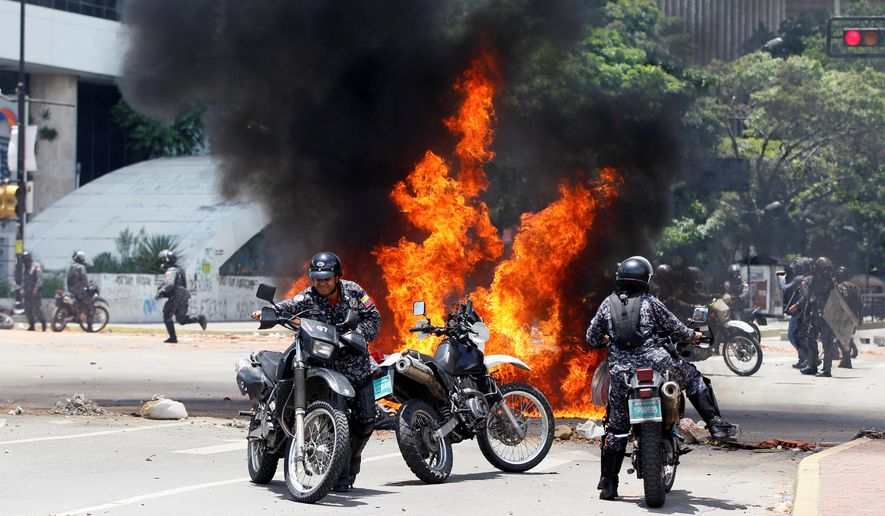BUENOS AIRES — The majority of Venezuelans on Sunday apparently refused to select members of a legislative body on whose purpose — to rewrite the country’s constitution — they never got to vote.
With the opposition declining to field candidates in an election it deemed yet another power grab by President Nicolas Maduro, turnout was seen as the most viable measure to gauge the support his embattled government was still able to muster.
Hours before voting had ended, Vice President Tareck El Aissami claimed that Venezuelans had “massively” heeded the government’s call to fill the Constituent Assembly’s 545 seats, but images and footage of deserted polling places told a different story.
Julio Borges, president of Venezuela’s opposition-controlled parliament, insisted at a midafternoon press conference that fewer than 7 percent of eligible citizens had obliged, and accused the government of widespread fraud to skew the numbers.
“The National Assembly was elected by 14 million Venezuelans,” Mr. Borges said. “Until now, not even a million and a half Venezuelans have voted [in the Constituent Assembly selection].”
Figures that low also pale in comparison to the more than 7 million ballots cast in an unofficial July 17 referendum the opposition held to give citizens a chance to weigh in on whether they want a new constitution in the first place.
Across Venezuela, meanwhile, Sunday’s vote was marked by clashes between demonstrators and security forces, and violence claimed the lives of four protesters and a candidate even before the polls opened. By early afternoon there were reports of at last a dozen casualties.
“These deaths were not in vain. These deaths are the seeds of freedom,” Mr. Borges said. “The race was between the free and rebellious Venezuelan people and an authoritarian government [acting] totally outside the constitution. And today the Venezuelan people won.”
The Constituent Assembly, set to meet for the first time as early as Wednesday, now will have sweeping powers to replace Venezuela’s 1999 constitution — along with that document’s nominal guarantees of separation of power and citizens’ rights.
Government hard-liners already have hinted that the body will move quickly to oust Attorney General Luisa Ortega — a longtime Maduro ally turned harsh critic — and minimize the National Assembly, whose very building it is bound to take over.
Some even worry that Mr. Maduro might go so far as to transform Venezuela into a Cuba-style, single-party state since dismal approval numbers and looming 2018 presidential elections limit the regime’s options, said Yorelis Acosta of the Central University of Venezuela’s Institute of Political Studies.
“So they find themselves bound to come up with fraudulent strategies to legitimize their hold on power,” Ms. Acosta said. “Who wants to give in knowing that [their] clique will be prosecuted when the government falls?”
And Sunday’s vote — along with the violent repression of protests with a death toll of more than 100 over the past four months — further highlights a regime desperate to cling to power.
“The government is like Alcoholics Anonymous: One day at a time,” Ms. Acosta said. “To them, every day, every month they maintain [and] sustain themselves is a success as they continue with their deals.”
The Trump administration, for its part, last week froze U.S.-based assets of 13 more Venezuelan officials — a list that already included Mr. El Aissami, who Deputy Assistant Secretary of State Michael Fitzpatrick said on Sunday hid more than $500 million in American accounts.
“This money must return to Venezuela,” Mr. Fitzpatrick told the NTN24 news channel. “We have frozen [Mr. El Aissami’s] assets, we have canceled his visas.”
But such targeted sanctions do not do justice to the severity of Venezuela’s crisis, said Christine Balling, a senior fellow for Latin American affairs at the American Foreign Policy Council.
“When you put sanctions on Russian oligarchs or Venezuelan businessmen, it basically has zero effect,” Ms. Balling said. “It’s doing something just so the box is checked.”
The lesson of Sunday’s vote, then, should be to abandon hopes that Mr. Maduro will somehow be persuaded to stop or slow his country’s descent into tyranny, she added.
“There have already been many nails is this coffin, but this should really be a no-brainer,” Ms. Balling said. In Venezuela, “democracy just doesn’t exist, period.”




Please read our comment policy before commenting.